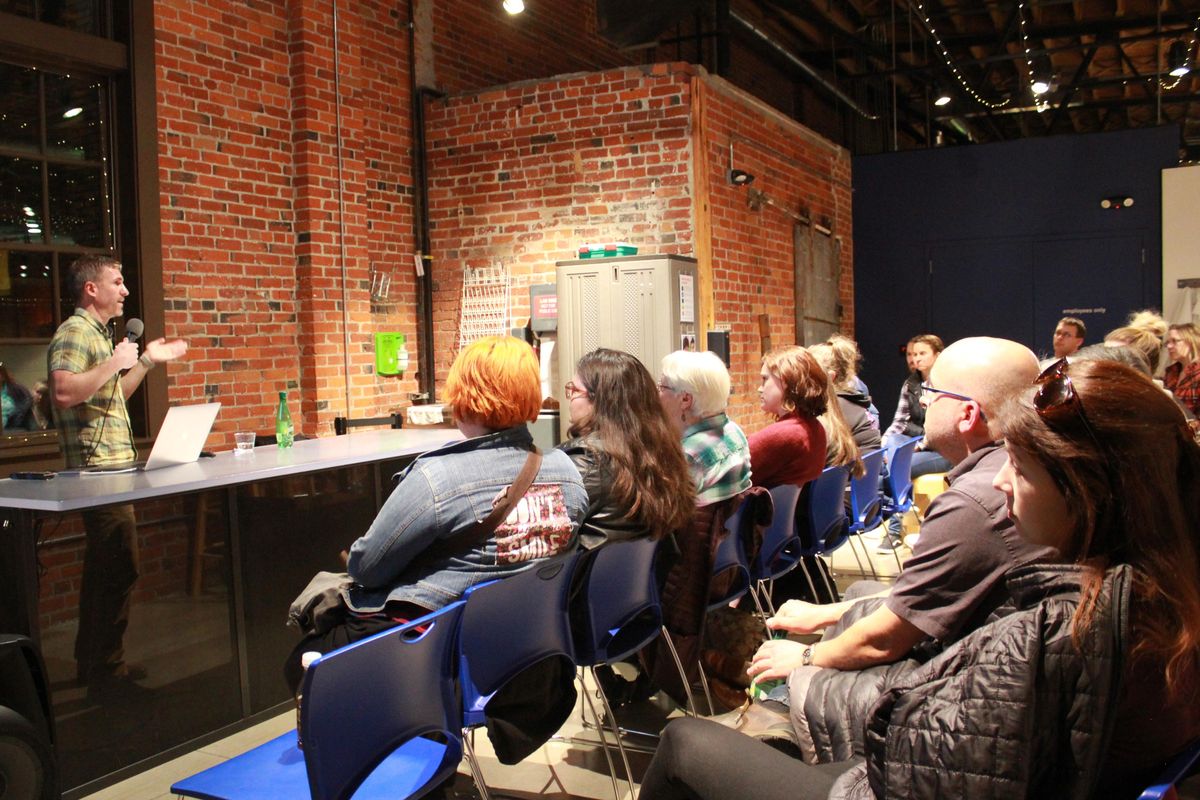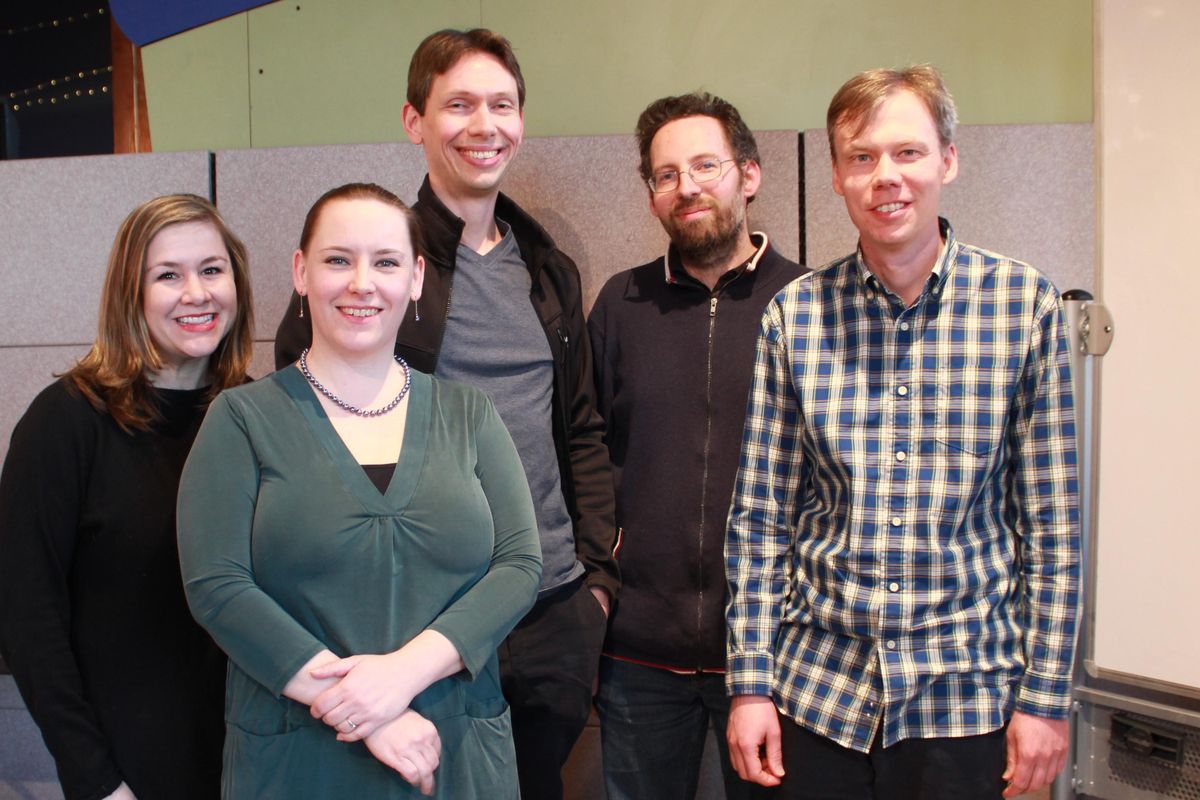Inland Northwest Concerned Scientists group aims to connect experts with the community through Science Cafes
Javier Ochoa-Reparaz, of Eastern Washington University, explains the connection between microbes in the gut and the brain during a Science Cafe talk, organized by the Inland Northwest Concerned Scientists group, on Monday, March 18, 2019, at Mobius Science Center. (Sandra Hosking / For The Spokesman-Review)
At a recent Science Cafe event, organized by the Inland Northwest Concerned Scientists, attendees happily consumed refreshments while some chatted about Superworms or hissing cockroaches.
Featured speaker Javier Ochoa-Reparaz, Ph.D., an assistant professor of biology at Eastern Washington University, explained the connections between microbes in one’s gut and the brain to about 50 people at Mobius Science Center.
“I’m not here to tell you which kombucha is good because I don’t know anything about that,” he says, eliciting laughter from the audience.
Inland Northwest Concerned Scientists is an informal group of like-minded academics and other science professionals who wish to share scientific knowledge with others. While the group is not focused on advocating for political issues, it does strive to educate.
“We stress the importance of science, which then informs social decisions and environmental decisions and everything else. Science needs to inform our policy,” David Syphers, Ph.D., an assistant professor of physics at Eastern.
The group launched the organization in 2017, following the March for Science, in which people across the country showed support for scientific principles.
“As scientists we want to stand up for scientific values, so science is taken into consideration for decision making,” says Krisztian Magori, Ph.D., an assistant professor in Eastern’s biology department. “We needed some organization that could bring people together to share those values locally.”
Similar organizations exist here, but they are for specific disciplines, such as the Spokane Astronomical society.
“We wanted an organization that is overarching in which we can incorporate not just scientists but also people from the public who value science, who want to see scientific discussions, open-minded people who want to be educated,” he says.
Since forming, the group has held about 15 Science Cafés to connect the public with experts in an informal setting where questions are encouraged.
“There is a big disconnect between the public and scientists. We don’t want to be sitting in our ivory towers,” Magori says. “A lot of people have genuine questions, and they don’t have anybody they can ask.”
The events are useful for the speakers as well because they might hear questions from the audience that they had not thought about.
“It’s really important for the general public to have access to some expertise,” Amy Gray, a biology lecturer at Eastern, says. “It’s very difficult to find that information as a citizen, even if it is available in journal articles. … Scientific fields have different vocabularies. In hosting something like the Science Café, you can dispense with vocabulary and just tell the story.”
Science Café topics have included emerging neutron stars and gravitational waves, ticks, radiation, Seasonal Affective Disorder, and more. Some talks reflect what is happening in the news, such as the Kilauea volcano eruption in 2018.
“It’s a really valuable way to show people what kind of work is going on. Even beyond that is a chance to get people to see that we’re real people who are genuinely excited about what we study … to see our process,” says John Orcutt, Ph.D., a paleontologist who teaches at Gonzaga University. He gave a Science Café talk on giant sloth fossils.
When the group launched the series, they discovered just how many scientists are in the Spokane area, working outside of academia in government agencies and private companies. The Science Cafés help facilitate networking for professionals and students.
“It’s good for a biologist to talk to an astrophysicist now and then,” Syphers quips.
Says Jenni Probert, operations manager for Eastern’s biology department, “We do lots of outreach through our department. We just saw a need to have more of a community impact and involvement.”
While the lectures aim to explain complex scientific ideas to a less technical audience, the ideas are not “dumbed down.”
“The number of times our speakers say, ‘We don’t know the answer,’ is powerful,” Probert says.
“We also shoot to make it fun. The idea is that you walk away, and you have more information to share at a cocktail party than you did before.”
Because science changes with new discoveries, the lectures are “a chance to show you off how much a new piece of information can change our thinking. It evolves anytime new information comes in,” Orcutt says.
The group generally does not charge a fee to attend Science Cafés but invites attendees to support the host restaurant.
On April 25, Steve Ghan, a Richland, Washington-based scientist, will speak on climate change at the Eastern Washington University Center building’s auditorium on the Riverpoint Campus at 7 p.m. Admission is free.

